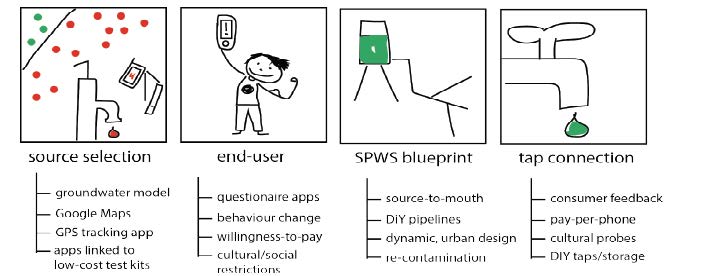Safe water for Bangladesh - Project Bangla
Large parts of the Ganges-Brahmaputra-Meghna Delta (GBM Delta) are densely populated, with the megacities Dhaka and Patna as pillars of the region. Urbanization of deltas puts a severe stress on the availability of clean, safe drinking water and therefore threatens the lives of millions, mostly affecting the poorest.
Arsenic-contaminated groundwater causes a widespread, serious health risk exposing millions of people worldwide. Chronic exposure to arsenic may cause cancer of skin, lungs, urinary bladder and kidneys. In the GBM Delta, in India and Bangladesh, this contamination has been recognized over twenty years ago; however, to date, arsenic mitigation strategies have collectively disappointed, due to the financial, institutional, environmental, technical and social (FIETS) complexity of the arsenic problem.
Water supply in the GBM Delta is predominantly organized through the use of scattered household hand-pumps, where the water safety is un-controlled, leading to contaminant exposure, particularly for the most underprivileged. A certain degree of centralization is desired from a water quality perspective, specifically for identification of the safest water source and post-implementation monitoring. Selection of safe, arsenic-free aquifers is seriously hampered by the high spatial variability in arsenic contamination levels in the shallow subsurface of the GBM Delta.
The DELTAP-project will develop a participatory approach for Small-scale Piped Water Supply. Water safety does not stop once the water has left the abstraction or treatment facility, but it should be guaranteed throughout distribution and usage.
We are five master-students from the TU Delft faculty of Civil Engineering and Geosciences. In July, we will travel to Rajshahi, in Bangladesh, to work on a part of the DELTAP project for two months. Our aim is to design a nano-scaled system that can provide safe drinking water for five to ten households. Interaction with the local communities will be of great importance in our design. The project consists of three different elements which will be explained in the next section.
The first element of our project is finding a safe water source. As arsenic contamination moves in time, it will be a challenge to determine where a source is safe or not. By studying the geology of the region, an arsenic-free well can be drilled. From this well, the water will be pumped and transported to a small community. Before transport, the groundwater will be treated in a small water treatment tank to remove other contaminants. From this point, the locals will be involved.
The DELTAP project will explore how SPWS can be designed with Do-It-Yourself practices to promote co-production of solutions, without sacrificing the robustness and safety of the water supply facility. The last step of our project is probably the most important: leaving the area with the feeling that the locals will be able to monitor and maintain the system themselves. Mobile crowd participation is a modern solution to get people involved. These tools rely on mobile phone applications, which can be utilized for end-user interaction, water quality analyses and behavioural change studies. We will mainly explore this new field in Rajshahi by communicating with the locals about their preferences and by teaching them about the importance of the water systems.
One of the main reasons that makes this project so special and educative for us is its versatile character. Besides the technical aspects, for which our knowledge and experience is needed in the end, the societal aspect is very relevant in this project. By providing safe drinking water to the local community we directly contribute to the quality of life in the area. The project will also directly contribute to the sustainable development goals that the UN has formulated. The two goals that we will contribute most to are: “clean water and sanitation” and “good health and well-being”.
One of the goals of the project is involving the local community in reaching a final sustainable solution. In our opinion, the success of the project will become larger when locals are involved to a large extent. This in turn will result in a feeling of responsibility among the locals. Another important point is that the locals will have to be able to maintain the system after we leave the area. Besides contributing to the community in Bangladesh, we will also learn very much ourselves as engineers. There are several aspects that we will learn from, as engineering students. First of all, the technical aspect. We will have to come up with a clever solution which combines the wishes from the locals with the available material in an economical and environmental favourable manner. Secondly we will have to work together as a group of five, considering every member has its own expertises and points of view, in a foreign country.
As we are students from different specializations, from geo-engineering to geohydrology and drinking water management, we will be able to study all single parts of this diverse project. The project will
consist of three different phases. The first phase will end before departure to Rajshahi. In this phase, we will write a detailed project proposal and we will do the administrative part, from vaccinations to funding. The second phase will take place in Bangladesh where we will make our proposal reality. In the last phase, we will finish our report and we will present our findings to our partners in the Netherlands.
Our team consists of five students from different master specializations at the Faculty of Civil Engineering and Geosciences: Tiemen Wegman, Bart Veenings, Irene Benito Lazaro, Rubayat Sobhan and Fransje van Oorschot
All five students will need to cooperate intensively with each in order to create a nano-scaled piped system. This will be a great challenge but as we are all social and professional engineers we are sure we can do something valuable in Rajshahi.
